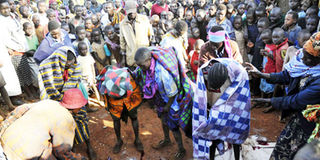Fight against female circumcision on course as Kenya intervenes, Parliamentary official says

Residents gather around Sebei teenage girls who have just undergone female genital mutilation while Prisca Korein (Left), a 62-year-old traditional surgeon, displays razor blades used to perform the practice on December 15, 2008. FILE PHOTO
What you need to know:
- Although the procedure has no medical benefits, it can leave women with a lifetime of consequences. Women can face infections, lack of sexual desire and difficulties in passing urine and faeces, studies have shown.
The fight to end the Female Genital Mutilation (FGM) is on course after promises by Kenyan government to also fight the vice, a top Parliament official has said.
Mr Musa Wamala Buyungo, the coordinator, Forum on Population and Development- Parliament said three years ago, Kenyan President Uhuru Kenyatta vowed to also fight the practice widespread at the border with Uganda.
Mr Buyungo said the pronouncement by President Uhuru was a very positive signal in the fight against FGM since some adamant girls would cross over to Kenya and get circumcised before returning to Uganda.
The new trend had started defeating the spirited fight against FGM, according to the official who was speaking at a dialogue in Kampala.
"President Uhuru Kenyatta of Kenya, about three years ago, made a commitment in ending FGM in three years. This was a good gesture by the President because as we are fighting the vice from Uganda, some girls would cross to the neighbouring Kenya and get circumcised from," Mr Buyungo said.
He continued: "As Parliament, we shall ride on President Uhuru's commitment and engage our Kenyan counterparts in a fight over cross border FGM to zero."
The dialogue organised by Center for Health, Human Rights and Development (CEHURD) in partnership with National population council (NPC) was a follow up on the Nairobi summit, aimed at localizing the promise for achieving zero unmet need for family planning information and services, zero preventable maternal deaths, and zero sexual and gender-based violence and harmful practices against women and girls in the region.
While in Nairobi at the ICPD conference, the President of Uganda joined other world leaders to make commitments which his government will do to achieve the three Zeros. Among his commitments were, operationalization of the National Sexuality Education Framwork, reduce unmet need of family planning from 28 percent to 10 percent by 2022, eliminate all forms of sexual gender based violence against women and girls like child marriages and FGM, among others.
FGM is the partial or total removal of the female external genitalia or other injury to the female genital organs for non-medical reasons as defined by the World Health Organisation (WHO).
Speaking at the same dialogue, Mr Davis Mwenyi, the Assistant Commissioner, Policy Analysis in the office of the President, said since Uganda's population is more than 60 percent youth, the president takes issues of the vulnerable that include the youth seriously.
In Uganda, the practice is common among the Sabiny community in Kapchorwa, Bukwo and Kween districts as well as the Pokot, Tepeth and Kadam in Nakapiripirit and Amudat districts.
Although the procedure has no medical benefits, it can leave women with a lifetime of consequences. Women can face infections, lack of sexual desire and difficulties in passing urine and faeces, studies have shown.
In the long term, they often report chronic pain and are significantly more likely to face life-threatening complications during childbirth such as caesarean sections and haemorrhaging after birth, according to a 2006 study conducted in six countries and published in the Lancet medical journal.



